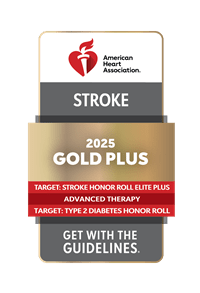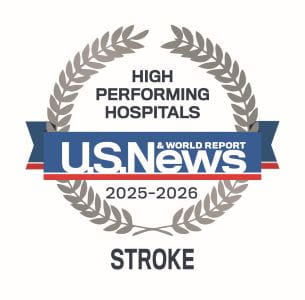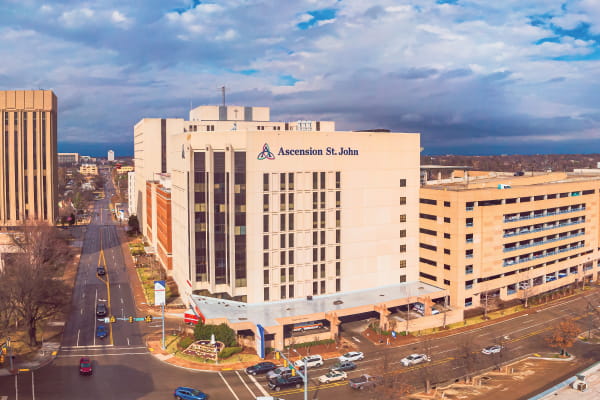
Advanced stroke care in Tulsa
-
How do I know if I'm having a stroke?
Stroke symptoms can come on suddenly. Call 911 and go to the nearest ER if you experience any of these stroke symptoms:
- Balance: sudden onset of dizziness or balance issues
- Eyes: double vision or loss of vision
- Face: asymmetrical weakness or drooping on one side of face
- Arm: one sided arm or leg weakness
- Speech: Listen for slurred speech
- Time: call 911 immediately
-
What is a stroke?
A stroke occurs when there is a disruption in the blood supply to the brain. This disruption can come from a blocked blood vessel in the brain or a blood vessel that ruptures and bleeds into the brain. When you are experiencing a stroke — every second counts. Call 911 and go to the nearest ER.
-
What should I do if I think someone else is having a stroke?
If you think someone is having a stroke, ask them to repeat a sentence back to you, smile at you, and raise both arms. If they have trouble with any of these tasks, call 911 right away. Stay with the person and note the time they began to have symptoms. This information can help the emergency room care team.
-
What is a mini-stroke, also called a transient ischemic attack (TIA)?
When someone experiences stroke symptoms that go away in a short period of time (typically less than an hour), it may be considered a TIA (transient ischemic attack.) When blood flow to the brain is interrupted for a short period (usually less than five minutes), it may be a sign of a future stroke. TIA is an emergency like stroke. If you experience signs of a stroke or TIA, don't wait to see if the symptoms go away. Call 911 and go to the nearest ER.
-
How is stroke treated?
The sooner you get to the ER, the more options there may be for treatment. Medications and minimally invasive stroke interventions help remove clots and dissolve blockages to restore blood flow to the brain for ischemic (non-bleeding) strokes. For certain hemorrhagic strokes (bleeding strokes), endovascular procedures are used to repair the blood vessel. Your doctors, nurses, and rehabilitation therapists help you recover after a stroke and help prevent a future stroke.
-
Carotid Procedure 30 day stroke and death rate
Carotid procedures are done to open severely narrowed arteries and restore blood flow to the brain. These procedures are often performed to treat or prevent strokes.
- Ascension St. John Comprehensive Stroke Center
- Asymptomatic
- 0% (Goal: <3%)
- Symptomatic - prior neurological event
- 4.87% (Goal: <6%)
- Asymptomatic
- Ascension St. John Comprehensive Stroke Center
-
Diagnostic cerebral angiogram 24-hour stroke and death Goal < 1%
Cerebral angiogram is a diagnostic test to evaluate the blood vessels in the head or neck to assess for blockages or abnormalities. This minimally invasive procedure helps to diagnose and determine the best treatment for certain patients with stroke and other cerebrovascular disease.
- Ascension St. John Comprehensive Stroke Center: 1.5% (Goal < 1%)
-
Emergent Treatment of Acute Ischemic Stroke Mechanical Thrombectomy Post-Treatment Reperfusion
In some cases a minimally invasive mechanical thrombectomy procedure is recommended to remove the clot in the brain that is causing the stroke. At Ascension St. John, 3 out of 4 patients who are eligible for this procedure have successful return of blood flow to the brain.
- Ascension St. John Comprehensive Stroke Center: 100%
- Ascension St. John Comprehensive Stroke Center: 100%
-
IV thrombolytic (clot busting medication) treatment: Median time in minutes Goal < 45 minutes
The faster stroke is treated, the more likely the patient is to recover. In fact, stroke patients who are treated with the clot-busting medication within 90 minutes of their first symptoms were almost three times more likely to recover with little or no disability. The thing to remember is that stroke is largely treatable. It’s a matter of getting the right treatment, right away.
- Ascension St. John Comprehensive Stroke Center: 86.7%
- Ascension St. John Comprehensive Stroke Center: 86.7%



